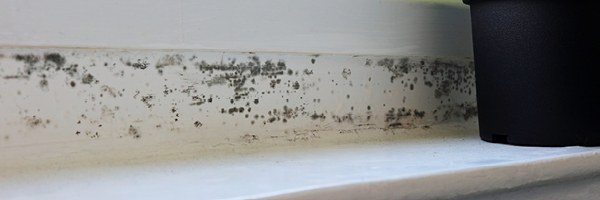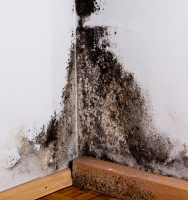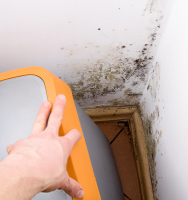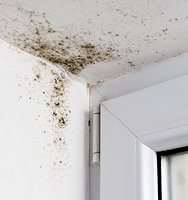
Black mold can take many different shapes and sizes, but it has a few key elements that can help you set it apart from dirt, debris and other types of mold. It’s very important to be able to recognize black mold and take quick action to remove it for your health and the integrity of your home or business structure.
Today we’ll walk through the properties of black mold, where it typically grows and more. You’ll be able to spot the spores like a professional and take the necessary steps to remove the mold. Last but not least, learn how you can use your home insurance or business insurance for help with mold remediation.
Black mold spores at a glance
There is no single type of mold called “black mold,” according to Medical News Today. Instead, “When people use the term, they may be referring to a type called Stachybotrys chartarum (S. chartarum), also known as Stachybotrys atra.” So technically, any mold that is black in color or close to it can be called black mold.
Sometimes black mold can have a dark green or blue hue to it. Mold spores can spread out over a surface like black polka dots or sit close together in a large blob depending on how concentrated the mold buildup is. Black mold is a microfungus, so it’s no surprise that it looks like a germ or organism you would inspect under a microscope.



On some naturally porous materials, black mold may be hard to differentiate from dirt stains, burn marks or other imperfections. Black mold on wood can easily be mistaken for dirt. Keep an eye out for spotty mold spores or swab the area with a mold testing kit if you’re unsure. It’s a bit easier to spot black mold on walls, vinyl shelving, laminate flooring and other smooth surfaces.
Did you know black mold smells? It has a distinct earthy scent that’s similar to damp wood, or worse, something rotting. If an area of your home or business smells like the woods after rainfall, it’s time to investigate for black mold.
Where black mold tends to grow
Where there’s water damage or humidity inside a building, there’s a possibility black mold is growing nearby. Let’s narrow some of the most common spaces where it grows:
- Windows—black mold on windows can happen anywhere the conditions are humid indoors or outside.
- Bathrooms—black mold can grow in the shower, on the wall near plumbing hookups, on a window, inside a vanity with water damage and more.
- Basements—black mold in basements is one of the most common mold occurrences. Check crawl spaces or basement walls for moisture.
- Ceilings and walls—black mold on ceilings and walls can form in humid rooms without proper ventilation or when water damage accumulates.
How to prevent mold growth
There are some steps you can take to prevent mold growth. Keep humidity levels in check with dehumidifiers, make sure dryers vent outdoors, and vent kitchens and bathrooms according to local code requirements. You should also inspect your property for damp or wet spots and fix any plumbing leaks as soon as you’re able.

Learn about our
Home Insurance
3 reasons to remove black mold as soon as possible
While not all black mold is toxic, it can be hazardous. Here are just three reasons to get mold remediation services as soon as you suspect or detect black mold:
- It can cause health problems—asthma and other respiratory problems, bacterial pneumonia, flu-like symptoms, diarrhea, allergic reactions like irritated skin, eyes, nose and throat. It can even cause memory loss.
- It can harm the integrity of your home or business features—lingering mold can ruin carpet, furniture, drywall, wood beams and so much more.
- It may not be clear if you have toxic or non-toxic black mold—any mold can be hazardous to your family, employees or clients. Medical News Today states, “Black mold does not affect everyone in the same way, but those with an allergy or sensitivity to the spores may experience symptoms such as congestion, red eyes, respiratory problems, skin rashes and so on. In some cases, an infection may occur.”
Call a qualified professional to remove black mold in air vents, ceilings, walls and more. Mold remediation services are a great way to ensure all the mold is removed.
Can you file an insurance claim for black mold?
The short answer is yes, as long as the mold is caused by a peril or event that your home or business insurance policy covers. The coverage will depend on whether your insurance outlines mold as a covered loss.
For example, if your home is hit by a severe thunderstorm that causes roof damage, it’s likely the water damage will impact your home. Mold can start growing while you are working with your independent agent to file an insurance claim and get the necessary home repairs. In this case, black mold remediation may be covered.
Or let’s say you own a small store and the bathroom starts to smell like must and mildew. You discover a leak coming from the sink plumbing. You get the leak fixed quickly, but there is already mold growth in the bathroom. In this case, you may be able to get mold remediation covered by your business insurance.
Talk to your independent agent today to learn more about mold remediation for covered perils.
References
Our partners at Zywave
Forbes
JSE Labs
EPA
Medical News Today
Coverages described herein may not be available in all states. Please contact a local independent Grange agent for complete details on coverages and discounts. If the policy coverage descriptions herein conflict with the language in the policy, the language in the policy applies. The material provided above is for informational, educational, or suggestion purposes and does not imply coverage. WE RESERVE THE RIGHT TO REFUSE TO QUOTE ANY INDIVIDUAL PREMIUM RATE FOR THE INSURANCE HEREIN ADVERTISED. Grange Insurance policies are underwritten by Grange Insurance Company, Trustgard Insurance Company, Grange Indemnity Insurance Company, Grange Insurance Company of Michigan and Grange Property & Casualty Insurance Company*. Not all companies are licensed in all states. *Not licensed in Pennsylvania.